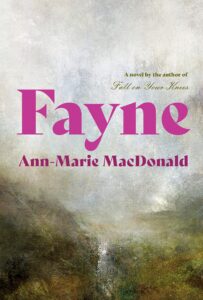Famous Canadian author Ann-Marie MacDonald returns with an incredible new historical novel. Fayne (2022) sweeps readers away to an expansive world of fantasy and wonder.
Set in late-nineteenth-century Scotland, Fayne follows Charlotte Bell, who is growing up at Fayne, the lonely and isolated Scottish estate that straddles the border between England and Scotland. Charlotte has been kept from society by her father, Lord Henry Bell, who adores her. Charlotte’s isolation is the result of a mysterious condition that compels her father to keep her from public view in order to protect her.
But Charlotte is bright, curious, and clever, always exploring the moor and reading everything she can get her hands on. She is haunted, however, by a portrait of her mother that hangs over the staircase at Fayne. Charlotte’s mother has died in childbirth after having her, and Charlotte’s older brother, Charles, died shortly before that. One day, when Charlotte’s explorations on the moor uncover a strange item, Lord Henry announces that he has arranged for Charlotte to be cured of her condition. What follows is a twisted and winding trail of family secrets, hidden truths, and nefarious individuals that will take Charlotte through a mystery that will upend her sense of her own identity.
This book was incredible—easily one of the best books I have read this year. As the latest iteration of neo-Victorian queer fiction, this book is a wonderful contribution to queer literary production. As an over seven-hundred-page text, the narrative is thorough and expansive, and the text places small details throughout that later come to have significant meanings for the whole plot. Therefore, this text requires careful reading, and it draws you in. I read it in a span of four days, and I was sometimes literally unable to tear myself away from the intricate narrative MacDonald has crafted.
Charlotte’s perspective is mesmerizing—I was rooting for her, and I was compelled by her mind and her quest for truth and identity in a world that appears to dissuade her from finding and understanding those things. Her journey is beautiful, and it resonates with contemporary readers as she embarks on a quest for autonomy and power in a highly binarized, gendered world.
There is also a magical element to this book that was alternately mysterious and compelling. MacDonald uses setting to her advantage, framing Fayne as a character in itself, and the surrounding bog as a place of wonder and danger.
Alternately touching, harrowing, enraging, and memorable, this book took me through a range of emotions to structure a tale that will definitely become an instant classic.
Please add Fayne to your TBR on Goodreads.
Content warning: medical violence, physical abuse, child loss, psychological abuse, non-consensual medical procedures.
Rachel Friars is a writer and academic living in Canada, dividing her time between Ontario and New Brunswick. When she’s not writing short fiction, she’s reading every lesbian novel she can find. Rachel holds two degrees in English literature and is currently pursuing a PhD in nineteenth-century lesbian literature and history.
You can find Rachel on Twitter @RachelMFriars or on Goodreads @Rachel Friars.



